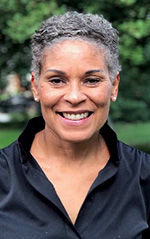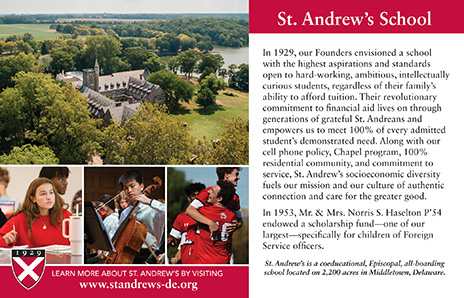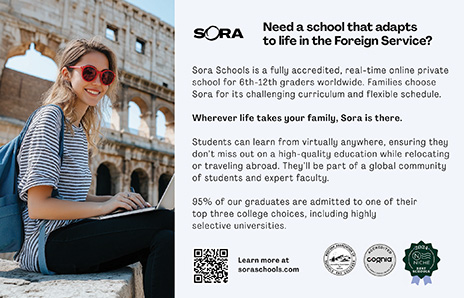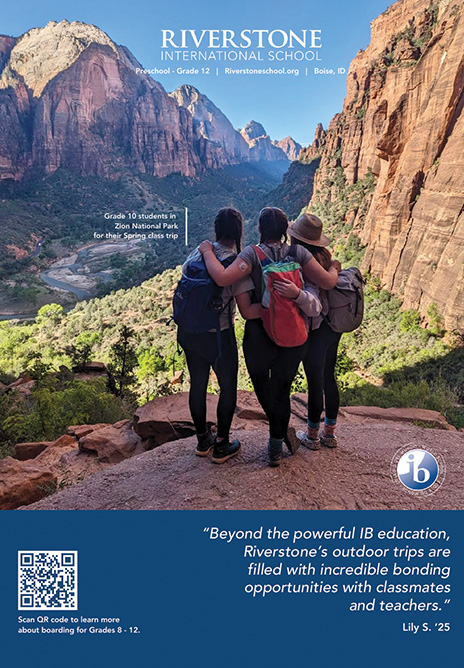Navigating the Foreign Service Educational Landscape
From preschool through college, you’re never alone. Learn about education resources available to Foreign Service families.
BY REBECCA MCPHERSON
Whether you are new to the Foreign Service community or have been posted overseas for years, you're likely to have questions about education issues that affect you and your family members overseas. What you need to know for your 2-year-old’s preschool education is vastly different from what you need to prepare your high school junior for the college application process. Understanding where to go and who to talk to is paramount when you are navigating your child’s education.
For many FS parents, the first stop is the Global Community Liaison Office (GCLO), formerly the Family Liaison Office. GCLO’s mission for the past 46 years has been to advocate for solutions to challenges posed by the Foreign Service lifestyle, to provide programs and client services that cater to all demographics in the community, and to extend these services overseas through the management of the Community Liaison Office (CLO) program.
Under the GCLO umbrella, the education and youth team functions as a central resource hub providing comprehensive information and connecting FS members to partner offices that can help answer questions and guide clients to what, where, and how to meet the educational needs of their children.
From Preschool to College
Every year, GCLO updates and distributes the Overseas Child Care Report (OCR), a snapshot of options for nannies, daycare, preschool, and summer camps available at overseas posts. This report is compiled by community liaison office coordinators (CLOs) at post and is meant to be a starting point for employees and their families to research options; it includes contact information for facilities used by families at that post, programs available, estimated cost of attendance, and more.
Contact GCLOAskEducation@state.gov or the CLO at post to request a copy. Your CLO can also connect you to other families who can provide feedback about these facilities.
The OCR is one of several reports available in the Overseas Briefing Center’s Post Info to Go (PITG) report, an extensive bidding resource tool that provides information about life at each post. Employees and family members can request access to PITG by emailing PostInfoToGoExternal@state.gov.
Transitioning Overseas and Back to D.C.

istockphoto / Last19
Heading back to D.C. for language training or an assignment? GCLO’s childcare webpage provides information on preschools and daycare facilities in D.C., Maryland, and Virginia, including at the Foreign Service Institute and near Main State. It also includes links to free preschools in Washington, D.C., as well as summer camp options.
Supporting children during transitions from school to school and post to post can be a daunting endeavor. Many factors come into play: everything from the size of the school to the course offerings, whether there is an orchestra or volleyball team, and if the student culture is welcoming.
If your child has specific behavioral, social, emotional, or educational needs, and you want to find out which schools overseas can meet these needs, connect with the regional education officers (REOs) in the Office of Overseas Schools. REOs have decades of experience as educators and administrators in international schools and maintain close working relationships with the school directors at the Department of State’s assisted schools.
Also check with the Child and Family Program (CFP) at the Bureau of Medical Services, as they determine eligibility and provide authorization for the Special Needs Education Allowance (SNEA).
If you are transitioning back to the D.C. area, the GCLO report “Bouncing Back: Transition and Re-entry Planning for the Parents of Foreign Service Youth” can help you guide your children through this process. If you have questions about dual immersion language programs or need to know which public schools offer the International Baccalaureate (IB) program, take a look at the resources listed on GCLO’s website.
The coordinators of the District of Columbia, Maryland, and Virginia (DMV) public school student registration offices understand the challenges that highly mobile families face and can be helpful when navigating the registration process. GCLO meets with and maintains a list of those contacts in its annual School Enrollment Guidance checklist; contact GCLOAskEducation@state.gov to request the list.
Homeschooling and virtual schooling have significantly increased since 2020, and GCLO now includes more than 100 home study programs that have been used by families in the FS community on its website. Familiarize yourself with the allowances available for homeschooling and accredited distance learning programs to help narrow down your choices.
And remember that you can seek support from both the Office of Allowances (GoASKallowances@state.gov) and your post financial management officer (FMO), who can guide you through the process of confirming which expenses are reimbursable.
The College Application Process
When it’s time to apply for college, parents often ask how their child can leverage their Foreign Service experience in college applications, and even how to narrow down the college choices—no small task for families overseas, who don’t have unlimited opportunities to visit stateside colleges.
What are the legal considerations you need to understand when your child heads to university while you are posted overseas? Where should you look for scholarships and financial aid? What alternatives are there to a traditional four-year college experience?
These crucial questions are answered on GCLO’s newly expanded College and Beyond webpage. The page contains information on qualifying for in-state tuition, college FAQs, and links to articles from experts within the Foreign Service community on the application process, colleges overseas, supporting your child’s emotional well-being while in college, and more.
There are contests, awards, and scholarships available from the American Foreign Service Association (AFSA), Associates of the American Foreign Service Worldwide (AAFSW), and the Foreign Service Youth Foundation (FSYF).
Evacuating Post During the School Year

istockphoto / Caiaimage_Robert Daly
You may be faced with the sudden news that due to political or civil unrest, a natural disaster, or some other factor, post will have to evacuate. Leaving post during the school year adds additional challenges to an already stressful situation. An evacuation will typically last about three months. There is always a chance, however, that it could be longer—evacuations can last up to 180 days.
You may have questions like, “What is the school’s plan during emergencies like this?” and “Where do I go for support to manage this process?” In the same way you should have a personal preparedness plan for your family, consider creating an educational “go plan” to meet your children’s specific needs.
Here are some steps to take to ensure your child’s educational continuity during either an ordinary move or an evacuation:
Collect and carry important documents. Ensure you have birth certificates (original or certified copies), photo IDs (passports), current special needs learning plan (IEP/ILP) if applicable, immunization records including proof of recent negative TB test, and most recent physical health exam records. Be prepared to hand carry these documents as you travel, and keep scanned copies on hand, as well.
Contact the school at post. Request official transcripts and records of course titles and current units of study, assignments and current grades earned, standardized or specialized test scores, and dates of attendance. Gather recommendation letters (especially for high school students). Be patient with the school as they may need several days to get these documents to you.
If possible, obtain the records in both paper and digital form. Find out if the school is planning to send your child with a physical packet of work, or if they have established a comprehensive plan for virtual learning. Ask if the learning will be asynchronous or synchronous.
Consider your options. Your bureau, post management, and GCLO’s crisis management team will likely coordinate an informational town hall with subject matter experts prior to departure to help with evacuation logistics. Decide where you want to safe haven, and identify your support system should the evacuation be extended.
If the school at post only offers synchronous learning, and that means your child would have to wake up at 2 a.m. where you intend to safe haven, think about whether your child can manage that, or if you should instead pivot to enrolling them in the local public school. You will know what is best for your child.
Communicate with the school at the safe haven location. Discuss with your family early on—preferably before an evacuation looms—where you would safe haven. Reach out to the school in the place where you will land, and check their website for registration requirements. You will need proof of residence/physical presence in the school district (mortgage, temporary quarters, or short-term lease agreements) to enroll.
Maintaining the routine of attending school will help when your children go back to school at post. If you have high schoolers, try to find a school with the same or comparable Advanced Placement (AP) or IB class offerings.
Connect with GCLO and the Office of Overseas Schools. Both GCLO and the Office of Overseas Schools can provide information and suggest tools to guide you during an evacuation. REOs can assist with getting transcript and course information from the Department of State (DOS) assisted school, and they can communicate with the school administration regarding any available virtual options.
In the Washington, D.C., area, GCLO’s education and youth team can connect you with public school registrars and student support offices that provide guidance and answer questions about registration and student placement.
You’re Not Alone
Sometimes it can feel like you’re the only family in the Foreign Service community ever to face these specific educational issues. But you’re not alone. Whether you’re grappling with early childhood education, special needs issues, college applications, or even an evacuation, chances are there’s a resource out there to help you make wise decisions. Contact the GCLO team with your education questions at GCLOAskEducation@state.gov.
When sharing or linking to FSJ articles online, which we welcome and encourage, please be sure to cite the magazine (The Foreign Service Journal) and the month and year of publication. Please check the permissions page for further details.
Read More...
- “Building Resiliency in Global Nomads” by Rebecca Grappo, The Foreign Service Journal, December 2008
- “Thinking Through Educational Options for your Foreign Service Child” by Rebecca Grappo, The Foreign Service Journal, June 2013
- “Special Needs Education Allowances: An Update” by Rebecca McPherson, The Foreign Service Journal, June 2023








